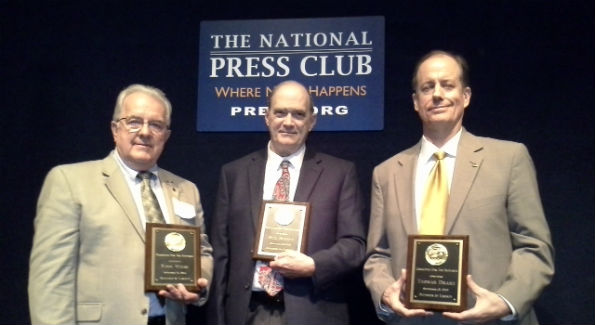National Security Agency whistleblowers share their stories and accept awards from the Committee for the Republic.

Three NSA whistle blowers J. Kirk Wiebe, William Binney, and Thomas Drake, each received a Defender of Liberty award. (Photo by Fran Griffin)
WWhen William Binney, Kirk Wiebe, and Thomas Drake were confronted with wrongdoing while working at the National Security Agency in early 2000, they couldn’t turn a blind eye as many of their colleagues had. They were forced to ask themselves if the pursuit of justice would be worth the risk of their careers and reputations. Wiebe explained: “Speaking truth to those in powerful positions within government can be a lonely act.” But that didn’t stop them.
On September 15, 2015 the three men gathered at the National Press Club to receive “Defender of Liberty” awards from the Committee for the Republic–a predominantly Republican group that educates citizens about the dangers of empire-building for the U.S. After years of persecution, Wiebe, Binney and Drake were presented accolades for speaking out against the NSA. The only thing more gripping than the personal stories they shared were the abuses they unearthed.
As the Internet blossomed in the mid ‘90s, the NSA was faced with the challenge of filtering national security threats from massive amounts of American citizens’ personal communications. In 1997, Binney–an NSA technical director at the time–believed there was a way to “save privacy and still succeed at doing intelligence.”
In response to the NSA’s need for an updated solution, Binney developed a cost- effective prototype, ThinThread. His program had the ability to sort through metadata and flag relevant communication without compromising the privacy of citizens promised by the Constitution.
General Michael Hayden, the NSA Director at the time, ignored the effort and instead chose to proceed with the costly Trailblazer program. Unlike ThinThread, Hayden’s initiative amassed an enormous volume of information requiring that city-sized storage facilities be built to house it.
President of the Committee for the Republic, William Nitze, said: “the NSA, not only did not need to collect massive amounts of data on U.S. citizens stored in their servers, but that massive data collection itself has made it impossible for NSA to do its job by focusing on the most probable threats. In simple terms, the larger and less differentiated the haystack, the harder it is to find the needle.”
Wiebe, who was familiar with both programs, went as far as to say 9/11 could have been prevented if the Agency had put their energy into culling important data under the ThinThread template. “During those five years focused on Trailblazer, NSA analysts were largely blind to the burgeoning world of network communications and the continuously emerging and evolving threats using them,”Wiebe said.
In addition to being inefficient, Trailblazer disregarded basic privacy for U.S. citizens as laid out by the Fourth Amendment.Wiebe recalled that ThinThread was rejected because “it threatened the opportunity for large businesses to obtain lucrative contracts in an attempt to solve one of NSA’s biggest challenges of the Information Age.” He went on to say: “It also threatened General Hayden’s credibility as he had gone to Congress claiming he needed big bucks to make big changes at the NSA in terms of its intelligence-producing capabilities.”
Binney called it an “empire building process” that wasted billions of taxpayer dollars and diverted the energy of NSA analysts. Ultimately, Trailblazer proved to be a complete failure.
In seeking the truth and a shred of justice, Wiebe, Drake and Binney filed a report with the Department of Defense in 2002 detailing the negligence they had witnessed at the NSA.The FBI and other federal agencies responded swiftly, raiding each of their homes.The ensuing process left Drake charged with treason against the nation he had worked so diligently to protect.
Despite the dire consequences they faced as whistleblowers against powerful U.S. government, Wiebe, Binney and Drake remained steadfast in defense of their rights as citizens.
At the conclusion of the award ceremony, Drake told the audience: “I’m going to keep standing up. I’m going to keep raging against the lies, against the corruption…because it really does matter. In the end, we are our own moral agents and the call that I make at this time is that we all exercise our moral agency together and individually wherever we are.” He continued with one final plea: “Do not, do not go silent into the night.”
“A Good American” directed by Friedrich Moser
William Binney’s remarkable tale is now documented in a movie, which recently screened in Washington. The film provides a deep-dive into Binney’s patriotic crusade to improve the security of the United States while upholding the constitution and his personal quest for liberty as a whistleblower.
For more information visit: www.agoodamerican.org
This article appeared in the May 2016 issue of Washington Life.




